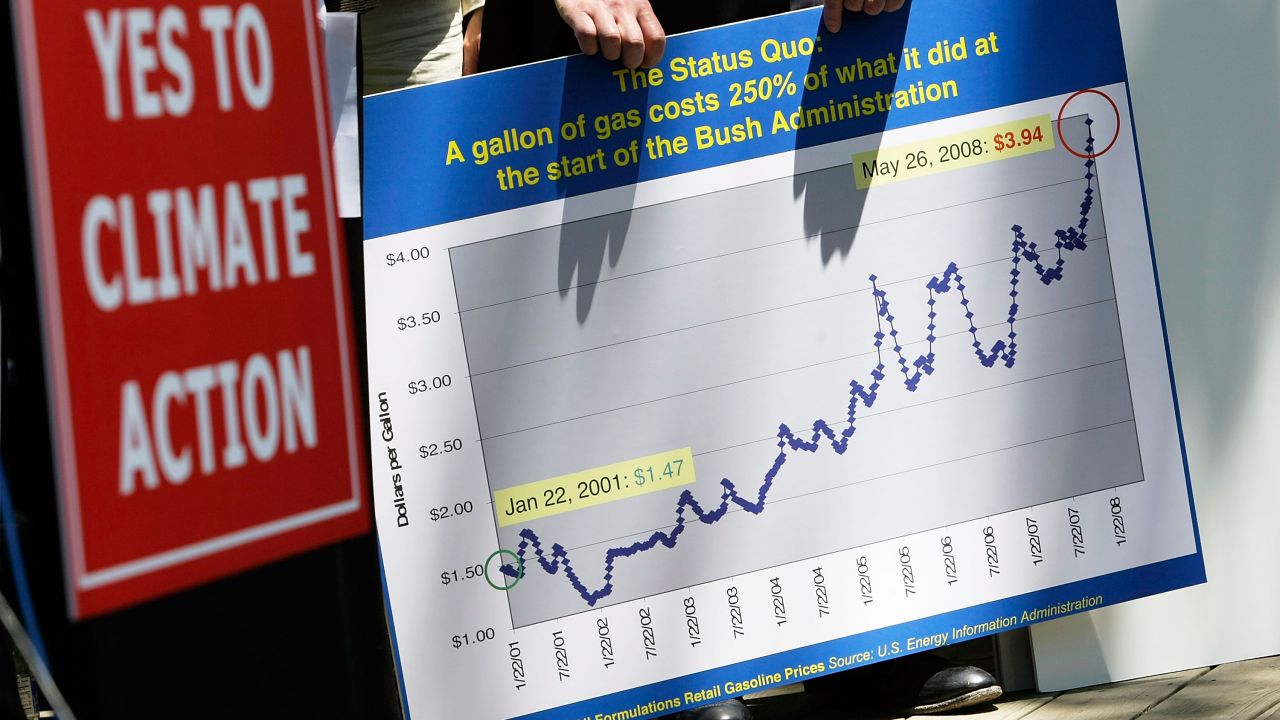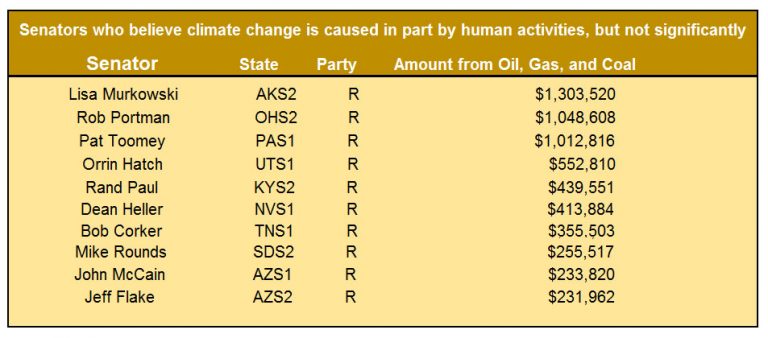
A Senate staff holds a chart showing the price change of gasoline since the Bush Administration took office during a rally to call on the Senate to take on action to address the challenge of global warming June 2, 2008 at the Russell Park on Capitol Hill in Washington, DC. (Photo by Alex Wong/Getty Images)
This post originally appeared at OpenSecrets.org.
For years now, the scientific consensus has been that climate change is occurring and is caused mainly by the actions of human beings. So why, during the first month of the current Congress, did nearly half the Senate — all Republicans — vote against an amendment stating that human activities contribute significantly to climate change?
We don’t know.
But we can say that those who voted for the amendment received less than one-fifth as much in campaign contributions from the oil & gas and coal industries as those who voted against it.
Senators who have publicly denied that humans have had a significant impact on climate change took in an average of $467,022 more from the coal mining and oil & gas industries since 2010 than those who have publicly accepted humans’ role in the global rise in temperature.
In connection with a bill focused on the now-failed Keystone XL pipeline in January 2015, Sen. Brian Schatz (D-HI) introduced an amendment that read “climate change is real and human activity significantly contributes to climate change.”
The first part of the amendment wasn’t controversial; the Senate had passed an amendment earlier that day acknowledging the existence of climate change by a nearly unanimous margin; only Sen. Roger Wicker (R-MS) voted against it. The stumbling block was the addition of language acknowledging that climate change is caused by people’s actions. Nearly half of the Senate opposed the amendment containing that text.
Senators who voted for the amendment received an average of $102,594 from individuals and PACs of the coal mining and oil & gas industries since 2010, while senators who voted against it received more than five times as much: $569,616.
Both the oil & gas and coal mining industries have significant incentives to halt efforts to stop climate change, which is caused in large part by gas-burning vehicles and coal-fueled power plants that produce greenhouse gases; any plans to tackle climate change would mean curbing the output of these gases, cutting into industry profits. Donating to lawmakers in the hope of preventing action on the issue would seem to be a good investment for them.
Much of the controversy that surrounds climate change has been fanned by organizations funded by the oil industry, including ExxonMobil and the billionaire industrialists David and Charles Koch. They’ve helped create the illusion of a debate when in reality few scientists dispute that climate change is real and is caused in large part by human actions.
The American Coal Council, the Independent Petroleum Association of America, the National Mining Association and the American Petroleum Institute did not respond to requests for comment.
Campaign contributions from fossil fuel industries are likely not the only incentive for senators to avoid acknowledging man’s impact on the climate. Many of those who voted against the amendment, and who also received significant sums from oil & gas and/or coal mining, hail from states with heavy production of either crude oil or coal.
And there are anomalies, highlighting how economic interests, campaign contributions and personal beliefs are hard to tease apart in searching for what motivates a vote in Congress.
For instance, nine senators who voted against the amendment come from states that don’t produce significant amounts of coal or oil. They’re also not on the Senate Energy Committee. These senators received an average of $341,811 from coal mining and oil & gas between 2010 and mid-2016. (We considered significant production to be more than 5,000 short tons of coal per year, and more than 5,000 barrels of oil, as measured by the US Energy Information Administration in 2014.)
Furthermore, there are 10 senators — nine Democrats plus Republican Sen. Mark Kirk — who voted for the amendment though their states produce both coal and oil in significant quantities. They’ve received an average of $153,176 from the industries between 2010 and June 30, 2016.
Twenty-five of the 51 senators who approved the measure were located in states where there was significant production of either coal or oil.
Besides Kirk, four other Republicans voted for the amendment — Lamar Alexander (TN), Kelly Ayotte (NH), Lindsey Graham (SC) and Susan Collins (ME) — along with Bernie Sanders (I-VT), plus all the Democrats. The Republicans voting “aye” received, on average, $276,232 from oil & gas and coal mining industries, which is $266,218 less than the average amount given to Republicans. Alexander is even on the Energy Committee, whose members usually receive much more cash from the oil & gas and coal industries than average.
A separate amendment proposed by Sen. John Hoeven (R-ND) said that human activities contributed to climate change, but lacked the “significantly” of the Schatz proposal. Hoeven’s measure picked up 10 additional Republican votes, but still did not pass. The average amount for senators voting against that amendment was about the same, at $584,799.
Here’s the breakdown of these senators, whose votes imply they believe climate change is caused in part by humans, but not significantly.
Sen. Jim Inhofe (R-OK), who chairs the Environment and Public Works Committee that oversees climate legislation, once brought a snowball to the Senate floor as a way to demonstrate his view that climate change is “the greatest hoax ever perpetrated against the American people,” though he later voted for an amendment stating that climate change is real. (Climate change refers to rising average global temperatures, not an absence of all sub-zero temperatures.) Inhofe has received $772,100 from the oil & gas and coal mining industries.
On average, current members of the Environment and Public Works Committee who voted for the amendment received just $39,717 from oil & gas and coal mining since 2010. Members who voted against it, like Inhofe, received an average $458,823.
Sen. John Cornyn (R-TX) has received the most money from these interest groups — over $1.6 million — since 2010. At the low end is Sanders, with just $3,350 in the same time frame.







